- Public Policy
- Leadership
- Funding
- News & Events
- About the Center
Back to Top Nav
Back to Top Nav
Back to Top Nav
Back to Top Nav
Looking for a spring course? Consider one of the Center's public policy offerings below.
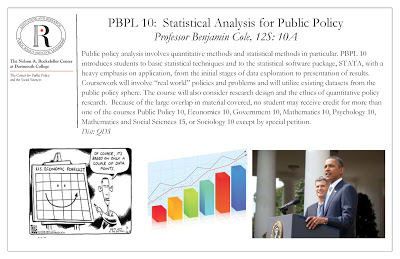
Brand New PUBLIC POLICY COURSE – Spring ‘12!
PBPL 10: Statistical Analysis for Public PolicyProfessor Benjamin Cole, 12S:10A
Public policy analysis involves quantitative methods and statistical methods in particular. PBPL 10 introduces students to basic statistical techniques and to the statistical software package, STATA, with a heavy emphasis on application, from the initial stages of data exploration to presentation of results. Coursework will involve “real world” policies and problems and will utilize existing datasets from the public policy sphere. The course will also consider research design and the ethics of quantitative policy research. Because of the large overlap in material covered, no student may receive credit for more than one of the courses Public Policy 10, Economics 10, Government 10, Mathematics 10, Psychology 10, Mathematics and Social Sciences 15, or Sociology 10 except by special petition. Dist: QDS
Also Available:
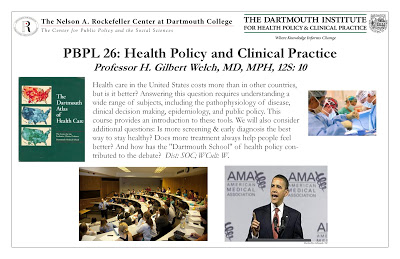
PBPL 26: Health Policy and Clinical PracticeProfessor H. Gilbert Welch MD, MPH, 12S: 10
Health care in the United States costs more than in other countries, but is it better? Answering this question requires understanding a wide range of subjects, including the pathophysiology of disease, clinical decision making, epidemiology, and public policy. This course provides an introduction to these tools. We will also consider additional questions: Is more screening & early diagnosis the best way to stay healthy? Does more treatment always help people feel better? And how has the "Dartmouth School" of health policy contributed to the debate? Dist: SOC; WCult: W.
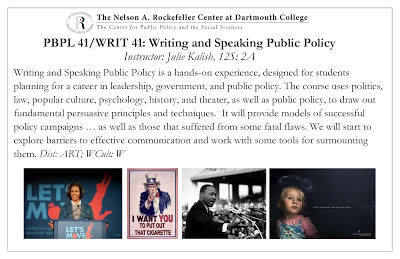
PBPL 41/WRIT 41: Writing and Speaking Public PolicyInstructor Julie Kalish, 12S: 2A
Writing and Speaking Public Policy is a hands-on experience, designed for students planning for a career in leadership, government, and public policy. The course uses politics, law, popular culture, psychology, history, and theater, as well as public policy, to draw out fundamental persuasive principles and techniques. It will provide models of successful policy campaigns … as well as those that suffered from some fatal flaws. We will start to explore barriers to effective communication and work with some tools for surmounting them. Dist: ART; WCult: W.
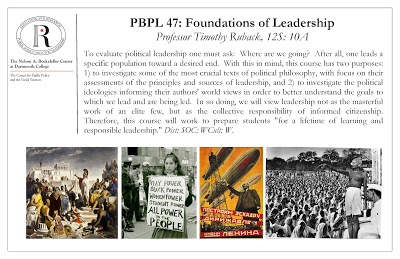
PBPL 47: Foundations of LeadershipProfessor Timothy Ruback, 12S:10A
To evaluate political leadership one must ask: Where are we going? After all, one leads a specific population toward a desired end. With this in mind, this course has two purposes: 1) to investigate some of the most crucial texts of political philosophy, with focus on their assessments of the principles and sources of leadership, and 2) to investigate the political ideologies informing their authors' world views in order to better understand the goals to which we lead and are being led. In so doing, we will view leadership not as the masterful work of an elite few, but as the collective responsibility of informed citizenship. Therefore, this course will work to prepare students "for a lifetime of learning and responsible leadership." Dist: SOC; WCult: W.
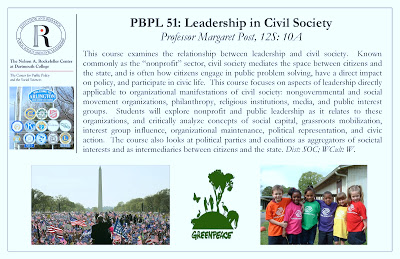
PBPL 51: Leadership in Civil SocietyProfessor Margaret Post, 12S: 10A
This course examines the relationship between leadership and civil society. Known commonly as the “nonprofit” sector, civil society mediates the space between citizens and the state, and is often how citizens engage in public problem solving, have a direct impact on policy, and participate in civic life. This course focuses on aspects of leadership directly applicable to organizational manifestations of civil society: nongovernmental and social movement organizations, philanthropy, religious institutions, media, and public interest groups. Students will explore nonprofit and public leadership as it relates to these organizations, and critically analyze concepts of social capital, grassroots mobilization, interest group influence, organizational maintenance, political representation, and civic action. The course also looks at political parties and coalitions as aggregators of societal interests and as intermediaries between citizens and the state. Dist: SOC; WCult: W.